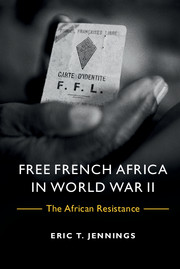Book contents
- Frontmatter
- Contents
- Figures
- Maps
- Acknowledgments
- Archival Abbreviations
- Glossary
- Introduction
- PART I FREE FRANCE'S AFRICAN GAMBIT
- Introduction to Part I
- 1 Colonies Without Motherlands
- 2 Africa as Legitimacy
- 3 Dysfunction in Gaullist Africa
- PART II THE WAR
- PART III RESOURCE EXTRACTION, WARTIME ABUSES, AND AFRICAN EXPERIENCES
- Epilogue
- Conclusion
- Bibliography
- Index
Introduction to Part I
from PART I - FREE FRANCE'S AFRICAN GAMBIT
Published online by Cambridge University Press: 05 August 2015
- Frontmatter
- Contents
- Figures
- Maps
- Acknowledgments
- Archival Abbreviations
- Glossary
- Introduction
- PART I FREE FRANCE'S AFRICAN GAMBIT
- Introduction to Part I
- 1 Colonies Without Motherlands
- 2 Africa as Legitimacy
- 3 Dysfunction in Gaullist Africa
- PART II THE WAR
- PART III RESOURCE EXTRACTION, WARTIME ABUSES, AND AFRICAN EXPERIENCES
- Epilogue
- Conclusion
- Bibliography
- Index
Summary
Historians have long depicted World War II as a catalyst for national emancipation movements, or for the decolonization process, depending on one's perspective. In most narratives, the war typically takes its place as a stage en route to the end of empires. Various arguments are advanced: “the blood tax” shed by native combatants, the psychological impact of the defeat of European troops by Japanese forces in Asia, the collapse of multiple colonial motherlands, a heightened awareness of the evils of Hitlerian racism, the “awakening” of nationalisms, or the propitious opportunity provided nationalists in India, Indonesia, and Vietnam. To be sure, some have distinguished between a first wave of decolonization in Asia following closely on the heels of World War II, and a later wave in Africa several decades later. Historians like Frederick Cooper and John Darwin have also nuanced the issue, insisting on post-1945 late imperial recastings. Yet even within the internal, teleological logic of World War II as a harbinger of decolonization, the moment of rupture has remained surprisingly understudied. It occurred in 1940 in the Free French case, in 1940 and again in 1942 in the Dutch East Indies, and in 1941 and 1942 for several British territories in Asia. These moments reveal imperial schisms, abrupt reorientations, and dramatic imperial reconfigurations, with former Dutch, French, and British territories colonized anew by Japan, for instance. They also concern a host of imperial contexts: to the Dutch territories in the Caribbean and Oceania, one could add the Belgian and Danish colonies.
One can discern multiple scenarios, although certain patterns do emerge. The Danish monarchy remained in place in the wake of the defeat of 1940, but in April 1941 the United States signed an agreement that granted Roosevelt the authority to protect the vastest Danish colony, Greenland, from Nazi incursions. It even permitted U.S. bases on the island. Washington recognized Copenhagen's rights over Greenland, and pledged to return the territory at the war's conclusion. Similarly, following the German onslaught in Norway and Denmark in 1940, the British invaded the Faroe Islands and Iceland preventatively.
- Type
- Chapter
- Information
- Free French Africa in World War IIThe African Resistance, pp. 11 - 16Publisher: Cambridge University PressPrint publication year: 2015



